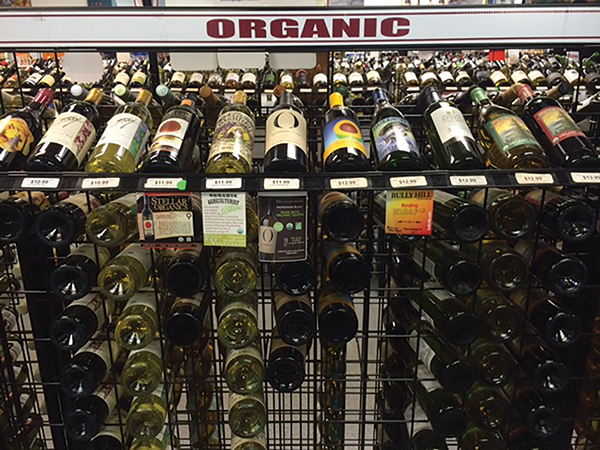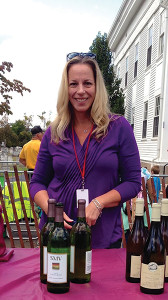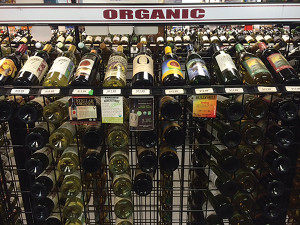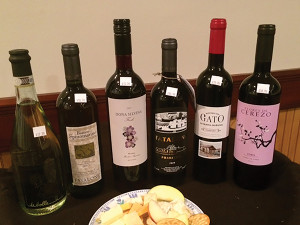
By Renée Allen
Helping consumers choose a wine used to be a fairly straightforward task, often ending with the answer to the simple question “Red or white?” With the rise in popularity of “green wine,” guiding customers now requires knowledge of methods used to produce these wines, in addition to familiarity with grape varieties and regions. But when it comes to being green, there’s still a whole lot of grey area.
While concepts such as “organic” have become more mainstream, new terms and regulations continually sprout up, causing confusion and creating misconceptions. By first determining the reason a customer wants to purchase green wine, shorter work can be made of navigating the sea of
green options.
The Allergic
This customer experiences an adverse response to wine, usually in the form of a headache and, typically, blames sulfites. In the experience of Doug Rankin, owner of the Missing Link Wine Company in Connecticut, the most often cited reason for seeking organic wine is health, with sulfites being the biggest concern. Although the FDA estimates that one out of 100 people are sensitive to sulfites to date, the medical profession has not singled out just one compound in wine as the cause of the “wine headache.” Several compounds in wine cause adverse reactions in drinkers sensitive to them, including alcohol, tannins, sulfites, and histamines. If sulfites are the true culprit, suggest 100% Organic Wine to which the addition of sulfites is prohibited in this country. Although all wines contain naturally-occurring sulfites, these usually only register between 0 and 10 ppm. If the allergy-provoking compounds are tannins, histamines, or alcohol, the customer may want to replace their red wine with white, which generally contains less of these substances.
The Environmentalist
These eco-friendly customers are organic food devotees, and have extended this umbrella to include wine. The impact on the environment from wine growing is of utmost importance to this consumer, who is a good candidate for the following:
» Organic Wine – Made with 100% certified organically grown grapes and the addition of sulfur is prohibited. *Rules differ for EU countries, which allow for the addition of a limited, though typically low, amount of sulfur.
» Made with Organic Grapes – Made from 100% certified organically grown grapes and contains less than 100 ppm sulfur.
» Biodynamic – Referred to as über organics, biodynamics begins with an organic foundation and follows a practice of minimal manipulation and environmental impact. Practitioners, who believe that all parts of the universe are an interconnected ecosystem, conduct viticulture in accordance with the phases of the moon. Sulfur is allowed, although kept to a minimum.
» Sustainably Farmed – This type of agriculture is often relegated to a subsidiary category by proponents of organics due to the fact that its lack of a precise, regulated definition* makes it susceptible to exploitation. Like organics, it attempts to leave the land for the next generation in better condition than it was when it was inherited. However, rather than implementing black and white rules, sustainability employs a case-by-case balancing test, and goes one step farther in its consideration of the environment’s future by addressing issues that organic principles do not, such as global warming, water usage and greenhouse gases.
* Private sustainability regulating programs are beginning to appear in a few states, including California and New York.
The Naturalist
Born in France, the natural wine movement goes by many other names – real, authentic, raw, naked. This customer desires wines created with a minimal amount of additives or intervention. Although there is no consensus on an exact definition, these wines typically involve the use of indigenous yeast, sustainable viticulture, environmental sensitivity, and the retention of a sense of place. This customer has an appreciation for wines that genuinely reflect their terroir.
The Foodist
This customer restricts what they ingest based on health and/or philosophical reasons, and will appreciate all of the above categories. Vegetarians can opt for wines labeled “vegan” for which bentonite, a type of clay, is used in place of animal-based fining agents. The term “raw” has recently been adopted by some raw foodists to refer to wines that meet the requirements of their diet, which is comprised of only uncooked, unprocessed food that has not had its temperature raised above 118°F. Because temperatures are kept below 100° during fermentation, the issue lies with added processed components, such as sugar. Until such time as winemakers start putting the word “raw” on their labels, going naked with the naturalists may be the best choice for the raw foodists.
CONSUMER CHOICES
Consumers are interested in and educated about the products they buy, with sustainability considerations and personal ideals influencing purchases, more than ever before. But even those already seeking greener choices struggle with understanding what’s available. First, know the nuances of green wine. Next, understand the customer’s concerns so that you can recommend the shade of green that suits them best.
Renée Allen is the founder and director of the Wine Institute of New England (WINE) based in Connecticut. She is a Certified Specialist of Wine and French Wine Scholar. WINE offers wine appreciation classes, food and wine pairing events, private and corporate events, and study courses for the Certified Specialist of Wine exam. WINE will be launching a study course for the French Wine Scholar exam in 2015.






